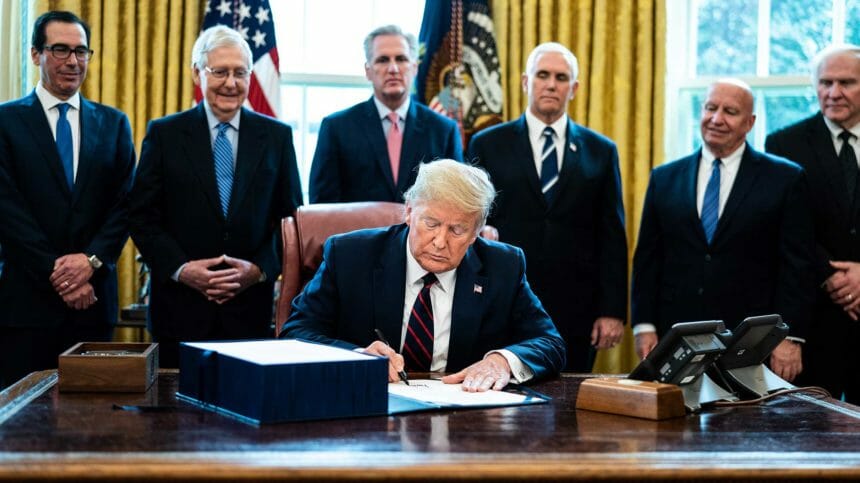
President Trump on Sunday extended the voluntary national shutdown related to coronavirus disease 2019 (COVID-19) until April 30. He previously had called for a shutdown until April 12, Easter Sunday.
The federal guidelines, among other points, discourage visits to long-term care facilities unless they are to provide “critical assistance,” discourage gatherings of more than 10 people, suggest that older adults and those with serious underlying health conditions stay at home, encourage workers to work from home here possible, and recommend avoiding nonessential trips as well as restaurants and bars, except for delivery and take-out. Several states have stricter orders in place, and the federal guidelines encourage citizens to follow the advice of their state and local authorities.
On Sunday, the Centers for Disease Control and Prevention reported 122,653 cases and 2,112 deaths in the U.S. from COVID-19. Anthony Fauci, MD, director of the National Institute of Allergy and Infectious Diseases, predicted Sunday that the U.S. death toll could be as high as 200,000 if the government and citizens don’t take appropriate steps.
It was just Friday that Trump signed the $2.2 trillion “Coronavirus Aid, Relief, and Economic Security Act” or “CARES Act,” into law. Among other provisions, it includes $100 billion in grants for providers to prevent, prepare for and respond to COVID-19 and reimburse eligible healthcare providers for lost revenues directly attributed to coronavirus. “Eligible healthcare providers” include Medicare and Medicaid providers and suppliers, as well as other for-profit and nonprofit entities “that provide diagnoses, testing, or care for individuals with possible or actual cases of COVID-19,” according to the American Health Care Association / National Center for Assisted Living.
“We appreciate this important and historic legislation to support our nation’s nursing homes and assisted living communities,” AHCA / NCAL Senior Vice President of Government Relations Clifton Porter II said, adding that the $100 billion fund was one of many items in the new law that will help long-term care providers. “We intend to let the administration know how crucial this funding is for our long-term care, health care workers who are serving our most vulnerable during this pandemic,” Porter added.
American Seniors Housing Association President David Schless told McKnight’s Senior Living, “The senior living industry is on the front lines of the COVID-19 crisis, and we believe the resources that will be made available through this legislation will provide needed financial relief to help offset some of the costs associated with the enhanced care, staffing and supplies needed to keep the one million seniors living our communities safe.”
Argentum, which announced Friday that it was changing its annual conference in May to an online event in September, reiterated that its advocacy efforts now will focus on the Health and Human Services and Treasury departments, “to ensure the needs of the senior living industry as a whole are fully considered under this emergency fund.”
Argentum and ASHA previously had expressed concerns about an earlier legislative package of COVID-19 relief, the Families First Coronavirus Response Act, subsequently signed into law March 18. The act’s allowances for paid sick leave, paid family and medical leave had the potential to “decimate” the senior living workforce, the organizations said. Saturday in an online post, the Department of Labor said that employees of retirement facilities, nursing facilities and nursing homes could be excluded by their employers from paid sick leave and / or expanded family and medical leave under the act.
In other COVID-19-related news:
- Heartis Arlington Assisted Living, operated by Frontier Management in Arlington, TX, said Friday that it would test its 75 staff members and 80 residents, who range in age from 70 to 100, for COVID-19. Two positive COVID-19 cases have been identified among residents who were transferred on March 18 and 22, respectively, to Medical City Arlington after exhibiting symptoms; they are now being treated and improving at the hospital, the company said. “Leadership became concerned when they realized that communication of the two patients’ positive statuses was never relayed by the Medical City Arlington to their community, but rather, Heartis learned from communication with the families of those impacted — a full six days after their loved one was transferred for testing,” the operator said in an announcement.
- Wichita, KS-based Legend Senior Living said Friday that it will begin offering COVID-19 testing at all of its more than 40 senior living communities to significantly reduce wait time for results, in turn potentially reducing the risk of COVID-19 infection in its communities. Legend to date has had no cases of COVID-19 in its communities, Chief Operating Officer Chris Mahen said. The company is working with PLS Scientific Laboratories and its partner Assurance Scientific Laboratories.
- The Equal Employment Opportunity Commission has posted a webinar to address questions that may arise related to federal equal employment opportunity laws and the COVID-19 pandemic.



